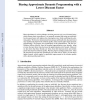Free Online Productivity Tools
i2Speak
i2Symbol
i2OCR
iTex2Img
iWeb2Print
iWeb2Shot
i2Type
iPdf2Split
iPdf2Merge
i2Bopomofo
i2Arabic
i2Style
i2Image
i2PDF
iLatex2Rtf
Sci2ools
111
click to vote
NIPS
2008
2008
Biasing Approximate Dynamic Programming with a Lower Discount Factor
Most algorithms for solving Markov decision processes rely on a discount factor, which ensures their convergence. It is generally assumed that using an artificially low discount factor will improve the convergence rate, while sacrificing the solution quality. We however demonstrate that using an artificially low discount factor may significantly improve the solution quality, when used in approximate dynamic programming. We propose two explanations of this phenomenon. The first justification follows directly from the standard approximation error bounds: using a lower discount factor may decrease the approximation error bounds. However, we also show that these bounds are loose, thus their decrease does not entirely justify the improved solution quality. We thus propose another justification: when the rewards are received only sporadically (as in the case of Tetris), we can derive tighter bounds, which support a significant improvement in the solution quality with a decreased discount fa...
| Added | 29 Oct 2010 |
| Updated | 29 Oct 2010 |
| Type | Conference |
| Year | 2008 |
| Where | NIPS |
| Authors | Marek Petrik, Bruno Scherrer |
Comments (0)

